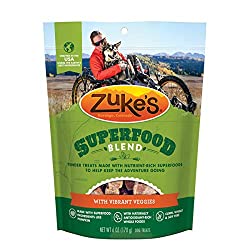
Yes, your dog can eat plain Edamame beans in moderation, but there are also some restrictions. You should not serve your pooch any fried, baked, or seasoned edamame beans. Edamame is rich in fiber and excess of anything can have dire consequences. While we don’t recommend it, it is fine as an occasional snack.
When thinking of your dog’s food, you might want to add some healthy options to it. Many dogs love different vegetables, one of which is Edamame beans. It is packed with many nutritional benefits but similar to Chestnuts, you should prepare it properly and avoid flavors like salt before serving them to your pup. Otherwise, your canine can get dehydrated quickly!
Table of Contents
What are Edamame beans?

They are whole, young soybeans that are green. The literal meaning of the word Edamame is “beans on a branch.” Edamame can be pulled off from the branches and eaten without being refined.
It is usually served boiled or steamed and added with salt or other condiments. A part of East-Asian cuisine, Edamame can be found in many Japanese dishes. People can eat them individually or in salads. You usually pop the pod, eat the Edamame beans, and throw away the pods.
Is Edamame soy?
Edamame is immature soybean picked off from the branches when it is still immature and tender green.
The difference between Edamame and regular soybeans is that people usually consume regular soybeans when they are fully grown and turn light brown.
Is Edamame safe for dogs?
Yes, Edamame is safe for dogs if not overfed. Like Brussel sprouts, giving your pup Edamame in moderation is key. Following are some of the health benefits that make it safe for the dog.
Health Benefits:
- Nutrient benefits.
- Helps to regulate the digestive system.
- Reduces the risk of diabetes.
Let’s diver deeper into what some of the nutrient benefits are.
What are some nutrient benefits of edamame for dogs?

Edamame provides a lot of nutrient benefits to dogs. It is naturally low in calories but can give an instant boost of energy to your pup. The nutritional elements present in these beans make them a perfect choice for occasional treats or snacks.
Edamame is rich in:
- Proteins.
- Vitamin K. Helps with heart health.
- Vitamin C. Acts as an antioxidant that helps to lessen cognitive aging and inflammation in dogs.
- Minerals.
- Omega-3. Helps with brain development, reduces inflammation, and improves immunity.
- Fiber.
- Has Low cholesterol.
- Lowers the risk of prostate cancer.
Additionally, Edamame reduces not just the obesity in dogs but also gives them healthy skin and coat. Following are some of the benefits of these immature green soybeans:
1. Weight control and management
Edamame contains fiber which is best for controlling and managing weight.
2. Significantly improves heart health
Along with fiber, Edamame contains Vitamin K and antioxidants. These elements reduce the chances of heart disease and help in improving the blood lipid profile.
3. Aids in maintaining a good digestive health
The fiber in edamame beans is considered very healthy for the digestive system.
4. Gluten-Free
Some dogs may suffer severe side effects from eating food that has gluten. For instance, dogs that are allergic to gluten may suffer from intestinal tract and joints inflammation if they accidentally consume food with gluten.
Luckily, Edamame is gluten-free so you don’t have to feel guilty when feeding a little bit to your dog.
How much Edamame can you give your dog?

Please don’t give a handful of Edamame; start with one or two Edamame beans initially. If your dog does not have any reaction, you can give them 3 to 4 beans a day.
The pet owner should always give edamame beans in very small amounts. Though they are healthy, they should never be served too much at once because that can lead to various problems.
Edamame calories
Edamame contains a total of 122 calories per 100 grams serving. The nutritional elements include 5g fat, 6mg sodium, 436mg potassium, 10g carbohydrate, and 11g protein.
Is Edamame toxic to dogs?
No, Edamame is not poisonous to dogs. It provides your dog with loads of health benefits. It is dangerous only when overfed or served with any seasoning like salt, garlic, or onions.
Types of Edamame that aren’t dog-friendly
Though harmless for you, giving your dog edamame with seasonings like salt and pepper is the type of Edamame that isn’t canine-friendly. Condiments can irritate the dog’s stomach. Plain Edamame! That’s what suits your dog.
Preparing Edamame for your dog
There are different methods that you can use for preparing Edamame for your dog, such as:
- Raw: It is the easiest way, but you should remember to remove the beans’ shells before serving.
- Frozen: you can also give refrigerated beans to the dog.
- Mashed: Mash the beans and add them to the dog’s meal. This form is easily digestible.
- Cooked: Boiled or steamed beans without any seasoning are best for the dog.
What happens if your dog eats too much Edamame?
Edamame is rich in fiber, and excess of anything can have dire consequences. Overfeeding can lead to:
- Constipation or gas.
- Diarrhea.
- Allergy.
- Vomiting.
- Bloating.
- Upset stomach.
If your dog encounters any of these problems, you should take your pet to the vet as soon as possible. Along with that, you would also have to reduce the amount of Edamame intake or do not feed them to your pooch again.
Treatments if your dog has Edamame poisoning
The symptoms of edamame poisoning include upset stomach, diarrhea, and allergy. When you notice any of these symptoms after feeding your dog, your first step should be visiting the vet. The vet will guide you about the treatments available such as:
- Allergy treatment. The best treatment for this is to stay away completely from edamame/soybeans and any products that contain Edamame.
- Upset stomach treatment. OTC medication is one of the ways to treat the upset stomach of your dog.
- Diarrhea treatment. Edibles like yogurt, boiled potatoes (skinless), and white rice can work as treatment agents for diarrhea.
Canine-friendly alternatives to feeding your dog Edamame
When it comes to dog treats and snacks, be careful of any that contain salt or sugar. It’s best to choose treats or snacks that are canine-friendly. We give our furry family members these treats because they are packed full of superfoods, protein, vitamins, and minerals. Best of all, they are gluten-free.
FAQs on Edamame for dogs
Can dogs eat Edamame beans?
Yes, dogs can eat edamame beans. They can be a healthy addition to your dog’s diet, but they should always be given to your canine occasionally. Be sure to start off with just a little and see how your pup reacts to it.
Can dogs eat Edamame pods?
The pod is the covering that holds multiple edamame beans together. These are tough and difficult to digest. That’s why it is not recommended to give dogs edamame pods to eat. The edamame pods can have harmful effects on the digestive system of dogs.
Can dogs eat Edamame shells?

Well, edamame shells are not poisonous, and so if eaten, they will not cause any health hazard. While your dog can eat edamame shells, they are often tough to chew and hard to digest.
Thus, it is always recommended that you serve your canine with only the beans found inside, not the shells.
Can dogs eat raw Edamame?
Yes, your dog can surely eat raw Edamame. There are two ways to serve it to your dog.
First of all, for each bean pod, take off their string-like back. Now you may rinse the pods and serve them to your dog. In the second case, open the pods and present only fresh beans to your dog. The ideal amount to give your dog is 3 to 4 beans only.
Can dogs eat frozen Edamame?
When in the pods, you shouldn’t serve frozen Edamame to dogs. It is better to first remove the beans from the pod and then let the dog eat them.
It is similar to raw Edamame, but the texture is slightly different due to refrigeration. The serving size of frozen Edamame is the same as that of raw beans.
Can dogs eat steamed Edamame?
Yes, dogs can eat steamed Edamame, but it is best to properly prepare them before steaming them.
For example, properly washing and removing the pod’s stringy part. The steamed Edamame beans are a treat for your dog because they are tasty and tender. Dog owners should serve their canine only 3 to 4 steamed beans per day.
Can dogs eat cooked Edamame?
Yes, canines can also eat cooked Edamame, but the nutritional benefits are going to be less.
Can dogs eat baked Edamame?
Plain baked Edamame is fine, but it is not suitable for your pup to eat baked Edamame if you add some form of seasoning, flour, or butter as this can potentially damage his stomach.
Ideally, plain beans are considered more beneficial and healthy for dogs.
Can dogs eat fried Edamame?
Fried Edamame is considered too fatty for pets like dogs. As Edamame is a young soybean, one should not ruin this nutritious veggie by frying it before serving it. It can cause pancreatic cancer and increase your canine’s cholesterol level.
Edamame for dogs acts as an allergen?
Soy allergy is common in dogs, so, in the beginning, give your dog a small amount of Edamame. Look out for any allergy signs such as hair loss, excessive scratching, or licking. If your dog develops any symptoms, immediately stop giving Edamame to your dog.
Why do dogs love Edamame?
Your four-legged friends may fall in love with the buttery, sweet and nutty texture of the edamame beans because dogs tend to like foods that are rich in protein and fiber.
DISCLAIMER: THIS WEBSITE DOES NOT PROVIDE MEDICAL ADVICE
The information, including but not limited to, text, graphics, images and other material contained on this website are for informational purposes only. No material on this site is intended to be a substitute for professional veterinary advice, diagnosis, or treatment. Always seek the advice of your veterinarian or other qualified health care provider with any questions you may have regarding dietary needs.
Resources:
https://vcahospitals.com/know-your-pet/food-allergies-in-dogs
https://www.petmd.com/blogs/nutritionnuggets/jcoates/2011/coates/food_allergy_myths-11862

With over five years of specialized experience as an animal writer, my expertise lies in dog nutrition, health, behavior, grooming, and training. I am dedicated to delivering helpful and informative content that caters to the well-being of our furry friends. My primary goal is to empower pet owners with knowledge and ensure our canine companions thrive in health and happiness. In my free time, I love volunteering at local dog rescue centers.










